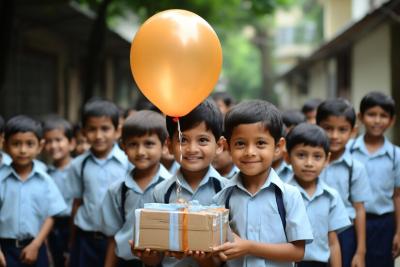Categories
Tags
Archives
How Donating For Education Can Create Long-Term Lasting Change
-
Posted by Aashika Bhatia Filed in Other #donation for education #donation for child education 524 views
The Importance of Education
Education is one of the most powerful tools for creating a sustainable and equitable future. It is the foundation upon which societies are built and transformed. Quality education empowers individuals, improves their quality of life, and has far-reaching impacts on communities and nations. When children receive an education, it paves the way for progress and innovation in every sector, from health to the economy.
However, governments and NGOs need to make special efforts to ensure that every child, worldwide, has access to quality education. These entities align to ensure that children, especially those from marginalised communities, have access to educational opportunities. This is where the concept of donation for education comes in. Donors can help provide children with the tools they need to succeed by making a donation for child education. Not only does it help individual children, but it also contributes to long-term societal progress and sustainable development.
Education as a Foundation for Sustainable Development
Education plays a critical role in driving socio-economic change. Education helps reduce inequalities and promotes inclusive growth by providing individuals with knowledge and skills. Educated individuals are more likely to participate in the workforce, contribute to the economy, and make informed decisions that benefit their families and communities.
Moreover, education affects more than just the individual. An educated population is more likely to demand better governance, advocate for environmental sustainability, and contribute to society's overall well-being. For example, studies have shown that every additional year of schooling can increase a person's earnings by up to 10%. This not only improves their financial situation but also contributes to economic growth at the national level. Additionally, education helps reduce inequalities by giving marginalised groups, such as girls and children from low-income families, the opportunity to improve their circumstances. Individuals and organisations can help create a more equitable and sustainable future for all by donating to education.
Benefits of Donating for Education
Donating for education has several benefits, such as:
Empowering Future Generations
Donation for education empowers children by providing them access to quality schooling, which is often out of reach for less privileged families. Education equips children with the knowledge and skills they need to succeed, opening doors to better job opportunities and a brighter future. When you contribute to educational causes, you are directly investing in the leaders and innovators of tomorrow, ensuring that future generations have the tools to shape a better world.
Promoting Social Equality
Education plays a key role in reducing inequalities within society. By supporting education through donations, you help bridge the gap for marginalised groups, such as children from low-income families, girls, and those from minority communities. This promotes social equality by giving all children, regardless of their background, an equal opportunity to succeed.
Improving Community Health and Well-Being
Donation for child education has a direct impact on the health and well-being of communities. Educated individuals are more likely to make informed decisions about their health, practice better hygiene, and access healthcare services. In turn, this leads to healthier communities with lower rates of preventable diseases. By supporting educational initiatives, donors can help create a healthier, more resilient society.
Supporting Global Development Goals
Education is a fundamental pillar of global development, as outlined in the United Nations' Sustainable Development Goals (SDGs). By donating to education, you are contributing to the achievement of these goals, particularly SDG 4: Quality Education. This helps ensure that children worldwide have access to inclusive and equitable education, promoting lifelong learning opportunities. Your donations can help drive progress on a global scale, creating a more sustainable and equitable world for future generations.
Different Ways to Make a Change
Here are some ways in which you can contribute to child education in India:
-
Monetary Donations: Financial contributions to organisations like Bal Raksha Bharat (also known as Save the Children) can help fund essential educational programmes, build schools, provide scholarships, and equip children with the resources they need to thrive. Your donations directly support children's education and give them a chance to succeed.
-
Non-Monetary Contributions: Beyond financial aid, you can contribute by volunteering your time, mentoring students, or donating educational materials such as books and supplies. By partnering with Bal Raksha Bharat, you can help ensure that every child receives the quality education they deserve, regardless of their circumstances.
-
Ongoing Engagement: Stay involved with the cause by following up on the impact of your donations, spreading awareness, and encouraging others to support the NGO as well.
Urge people to take action today—support NGOs such as Save the Children India and be a part of the change.
The Way Forward
Donating for education is one of the most powerful ways to create long-term sustainable change. By contributing to education, donors are not only helping individual children succeed but also laying the foundation for a more equitable and sustainable future. Whether through monetary donations, volunteering, or providing educational materials, every contribution makes a difference.
Contribute to educational causes that align with your values and be part of the movement to create lasting change through education.
-
